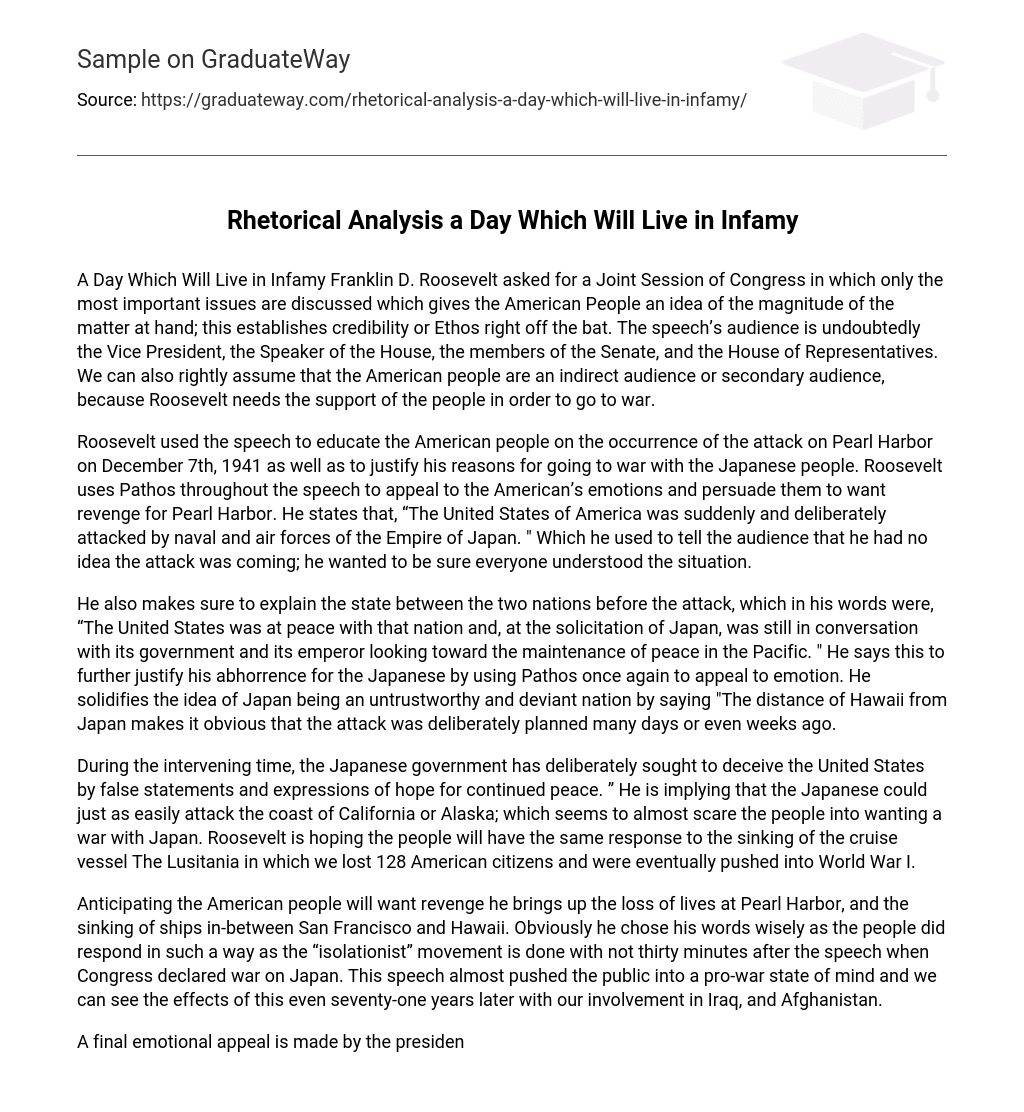A Day Which Will Live in Infamy Franklin D. Roosevelt asked for a Joint Session of Congress in which only the most important issues are discussed which gives the American People an idea of the magnitude of the matter at hand; this establishes credibility or Ethos right off the bat. The speech’s audience is undoubtedly the Vice President, the Speaker of the House, the members of the Senate, and the House of Representatives. We can also rightly assume that the American people are an indirect audience or secondary audience, because Roosevelt needs the support of the people in order to go to war.
Roosevelt used the speech to educate the American people on the occurrence of the attack on Pearl Harbor on December 7th, 1941 as well as to justify his reasons for going to war with the Japanese people. Roosevelt uses Pathos throughout the speech to appeal to the American’s emotions and persuade them to want revenge for Pearl Harbor. He states that, “The United States of America was suddenly and deliberately attacked by naval and air forces of the Empire of Japan. ” Which he used to tell the audience that he had no idea the attack was coming; he wanted to be sure everyone understood the situation.
He also makes sure to explain the state between the two nations before the attack, which in his words were, “The United States was at peace with that nation and, at the solicitation of Japan, was still in conversation with its government and its emperor looking toward the maintenance of peace in the Pacific. ” He says this to further justify his abhorrence for the Japanese by using Pathos once again to appeal to emotion. He solidifies the idea of Japan being an untrustworthy and deviant nation by saying “The distance of Hawaii from Japan makes it obvious that the attack was deliberately planned many days or even weeks ago.
During the intervening time, the Japanese government has deliberately sought to deceive the United States by false statements and expressions of hope for continued peace. ” He is implying that the Japanese could just as easily attack the coast of California or Alaska; which seems to almost scare the people into wanting a war with Japan. Roosevelt is hoping the people will have the same response to the sinking of the cruise vessel The Lusitania in which we lost 128 American citizens and were eventually pushed into World War I.
Anticipating the American people will want revenge he brings up the loss of lives at Pearl Harbor, and the sinking of ships in-between San Francisco and Hawaii. Obviously he chose his words wisely as the people did respond in such a way as the “isolationist” movement is done with not thirty minutes after the speech when Congress declared war on Japan. This speech almost pushed the public into a pro-war state of mind and we can see the effects of this even seventy-one years later with our involvement in Iraq, and Afghanistan.
A final emotional appeal is made by the president at the conclusion of his speech. He says “Hostilities exist. There is no blinking to the fact that our people, our territory, and our interests are in grave danger. ” This leaves the American public with the idea that their way of life is in danger, and that it would be foolish to keep the “isolationist” ideal. The other use of Ethos or even appealing to logic or Logos by Roosevelt is the stating of his Commander in Chief title, which gives the American People a reason to believe in his military campaign.
He says that “with confidence in our armed forces, with unbounding determination of our people, we will gain the inevitable triumph – so help us God. ” If the highest ranking military official believes in achieving the people have no reason to think otherwise. In conclusion I believe that Roosevelt’s use of Pathos, Ethos, and Logos in a very organized method is extremely effective in moving Congress to declare war and in gaining the support of the American people. Works Cited 1. “Day of Infamy” Speech by Franklin D. Roosevelt, December 8, 1941 Records of the United States Senate; Record Group 46; National Archives.





